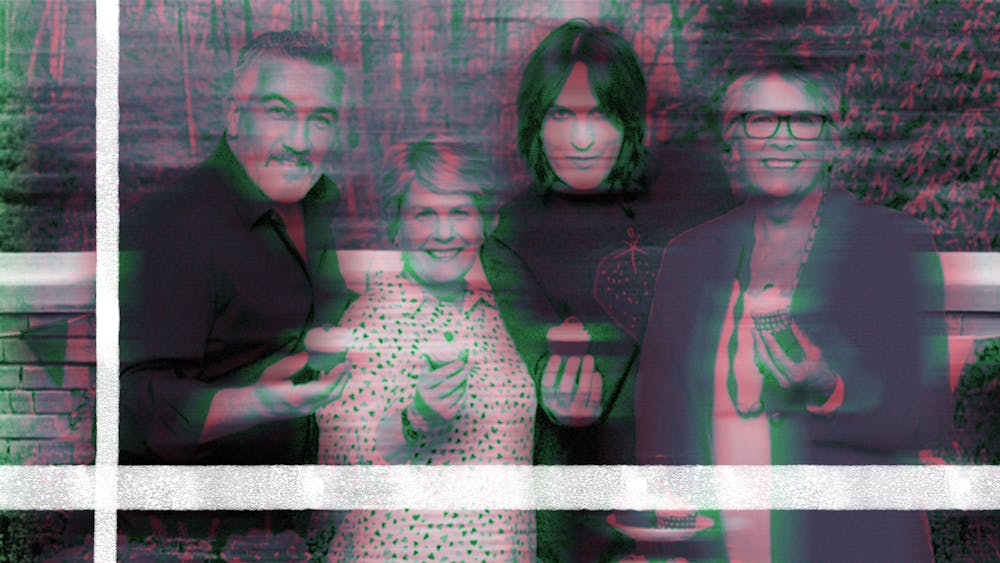The Great British Baking Show used to live up to its name. It used to be great, so great that if you said it was the best culinary program on television, you'd be met with little to no backlash. That is no longer the case. This season’s “Mexican Week” episode of The Great British Baking Show solidified the series as much less than its name suggests.
The “Mexican Week” episode begins with a clip of hosts Noel Fielding and Matt Lucas dressed in sombreros and serapes. Fielding expresses his excitement for “Mexican Week” and how he feels the pair should refrain from making any Mexican jokes as people could (very reasonably) become upset. Lucas responds by asking “Not even Juan?” To which Fielding says “Not even Juan.” That exchange, which occurs within the first 15 seconds of the hour–long episode, sets the stage for the many more offensive jokes and remarks to follow.
For those who aren’t familiar with the program, The Great British Baking Show (also known as The Great British Bake Off in Britain) is a baking competition in which home bakers compete against each other to impress judges Paul Hollywood and Prue Leith. Contestants come from all across Britain (and now, from all across Europe) to compete in three challenges per episode: the signature, the technical, and the showstopper.
The signature requires bakers to showcase a tried and true home recipe, the technical challenges the bakers’ skills and knowledge as they have to recreate a bake with vague instructions, and bakers show off their talents for both flavor and appearance in the showstopper. At the end of each episode, Paul and Prue crown a star baker and send the baker with the worst performance home. Usually, the challenges showcase traditional European desserts and pastries, but lately, the show has been trying to reach out to other parts of the world to showcase some of their “traditional” delicacies. This is where the “Mexican Week” episode fell short.
In comparison to episodes and challenges focused on European food, “Mexican Week” felt half–hearted. There’s never been a lack of historically accurate and authentic European representation on the show: English deserts are frequently featured in challenges, French pastry baking gets its own episode each season, and European desserts that viewers might not know of, like the prinsesstårta from Sweden, æbleskiver from Denmark, and the belokranjska povitica from Slovenia are showcased throughout the series.
For Mexican week, contestants were tasked with preparing pan dulce for the signature, tacos for the technical challenge, and a layered tres leches cake for the showstopper, all relatively well–known and popular dishes. The challenges reflected a major oversight on the part of the production team and the judges, who failed to showcase the intricacies and diversity of Mexican culture, as well as the technique present in Mexican cuisine. Tacos were an interesting choice for a technical, as they don’t require any baking whatsoever. On top of this, contestants were penalized for making the tacos “too spicy” for Paul and Prue’s likes. Some contestants didn’t understand that tiramisu and tres leches are not interchangeable. Prue also celebrated the contestants for creating cakes that “look Mexican” solely based on their use of bright colors and sometimes a big mustache.
This leads to the question of how qualified Paul and Prue are to judge and critique the Mexican dishes. The two certainly do not have the authority to determine whether a dish is “authentic” or not, as neither of the judges are Mexican themselves. In addition to this, the show is so far removed from Mexico that it can’t truly grasp Mexican cuisine like it can comprehend the cuisine of the countries surrounding the United Kingdom.
Sandwiched in between butchered pronunciations of guacamole or pico de gallo, and clips of probably one of the worst ways to cut an avocado, Fielding and Lucas were able to slip in insensitive jokes about Mexico and Mexican culture. At one point, the two were jokingly questioning whether Mexico was a real place.
The show is not a stranger to controversy surrounding cultural appropriation. Season 11 featured “Japanese Week,” which consisted of a bao bun (a traditionally Chinese dish) challenge and bakers that strayed away from Japanese flavors all together. Paul referred to traditional Jewish challah as “plaited bread,” and hosts Lucas and Fielding were subject to viewer backlash for inappropriate and exaggerated German accents during a German Week.
There are possible remedies to the issue of misrepresentation that were highlighted during the episode. In older seasons, former hosts Mel Giedroyc and Sue Perkins traveled to different cities in Europe and talked about the dishes with locals, but this segment has since been discontinued. Educating the viewers (as well as the bakers) on the history of dishes and their cultural significance could do a lot to alleviate the offensive dialogue and appropriation. Including short clips explaining the origins of the dish and how it is traditionally prepared would be an entertaining way to properly honor various cultures, and including a guest judge from the culture that is represented would allow dishes to be properly evaluated based on authenticity.
The attempts made in more recent seasons to broaden the scope of the foods covered in the show is a step to increase representation in media, but this season's half–baked efforts took it two steps back.







